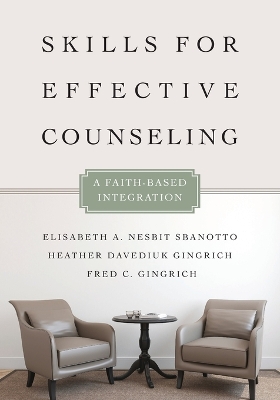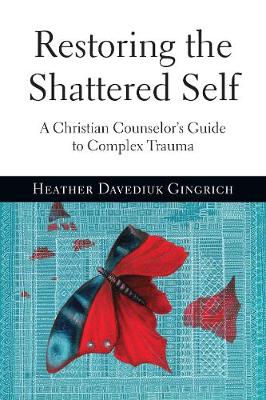Christian Association for Psychological Studies Books
2 total works
Skills for Effective Counseling
by Elisabeth A. Nesbit Sbanotto, Heather Davediuk Gingrich, and Fred C. Gingrich
Published 14 September 2016
Anyone in a helping profession-including professional counselors, spiritual directors, pastoral counselors, chaplains and others-needs to develop effective communication skills. But learning these skills is like learning a new language: it takes time and practice to communicate effectively, and lack of practice can lead to the loss of one's ability to use this new language.
Suitable for both beginning students and seasoned practitioners, Skills for Effective Counseling provides a biblically integrated approach to foundational counseling skills that trains the reader to use specific microskills. These skills include perceiving, attending, validating emotion and empathic connection.
Chapters include textbook features such as sample session dialogues, role plays and a variety of both in-class and out-of-class exercises and reflection activities that will engage various learning styles. Strategically interwoven throughout the chapters are special topics related to:
This textbook and the accompanying IVP Instructor Resources include all of the activities and assignments that an instructor might need to execute a graduate, undergraduate or lay course in foundational counseling skills. Professors teaching within CACREP-accredited professional counseling programs will be able to connect specific material in the textbook to the latest CACREP Standards.
Christian Association for Psychological Studies (CAPS) Books explore how Christianity relates to mental health and behavioral sciences including psychology, counseling, social work, and marriage and family therapy in order to equip Christian clinicians to support the well-being of their clients.
Suitable for both beginning students and seasoned practitioners, Skills for Effective Counseling provides a biblically integrated approach to foundational counseling skills that trains the reader to use specific microskills. These skills include perceiving, attending, validating emotion and empathic connection.
Chapters include textbook features such as sample session dialogues, role plays and a variety of both in-class and out-of-class exercises and reflection activities that will engage various learning styles. Strategically interwoven throughout the chapters are special topics related to:
- multicultural counseling
- biblical/theological applications
- current and seminal research related to microskills
- diagnostic and theoretical implications
- clinical tips for using skills in "real world" counseling settings
- the relevance of specific microskills to interpersonal relationships and broader ministry settings
This textbook and the accompanying IVP Instructor Resources include all of the activities and assignments that an instructor might need to execute a graduate, undergraduate or lay course in foundational counseling skills. Professors teaching within CACREP-accredited professional counseling programs will be able to connect specific material in the textbook to the latest CACREP Standards.
Christian Association for Psychological Studies (CAPS) Books explore how Christianity relates to mental health and behavioral sciences including psychology, counseling, social work, and marriage and family therapy in order to equip Christian clinicians to support the well-being of their clients.
What is complex traumatic stress disorder (CTSD)? How do Christian counselors help complex trauma survivors live the "abundant life"? Are we inadvertently retraumatizing our counselees?
The challenge of counseling survivors of complex trauma is one that many Christian counselors are not adequately equipped to handle. Too often the result is the painful reexperience of the traumatic event in a way that can further damage their personhood and alienate them from the church. In such sensitive cases, empathy and care must be wedded to the skilled application of foundational counseling principles.
Heather Davediuk Gingrich brings years of counseling experience to bear on this delicate and difficult issue. She presents Judith Herman?s classic three-phase model for dealing with CTSD, focusing on safety and stabilization, the processing of traumatic memories, and consolidation and restoration. Gingrich ably integrates the established research on trauma therapy with keen insights from her own experience and an intimate understanding of the special concerns related to Christian counseling--including a discussion of prayer and spiritual warfare. This work is a thoughtful and much-needed guide for working with complex trauma that is essential reading for counselors and pastors alike.
The challenge of counseling survivors of complex trauma is one that many Christian counselors are not adequately equipped to handle. Too often the result is the painful reexperience of the traumatic event in a way that can further damage their personhood and alienate them from the church. In such sensitive cases, empathy and care must be wedded to the skilled application of foundational counseling principles.
Heather Davediuk Gingrich brings years of counseling experience to bear on this delicate and difficult issue. She presents Judith Herman?s classic three-phase model for dealing with CTSD, focusing on safety and stabilization, the processing of traumatic memories, and consolidation and restoration. Gingrich ably integrates the established research on trauma therapy with keen insights from her own experience and an intimate understanding of the special concerns related to Christian counseling--including a discussion of prayer and spiritual warfare. This work is a thoughtful and much-needed guide for working with complex trauma that is essential reading for counselors and pastors alike.

